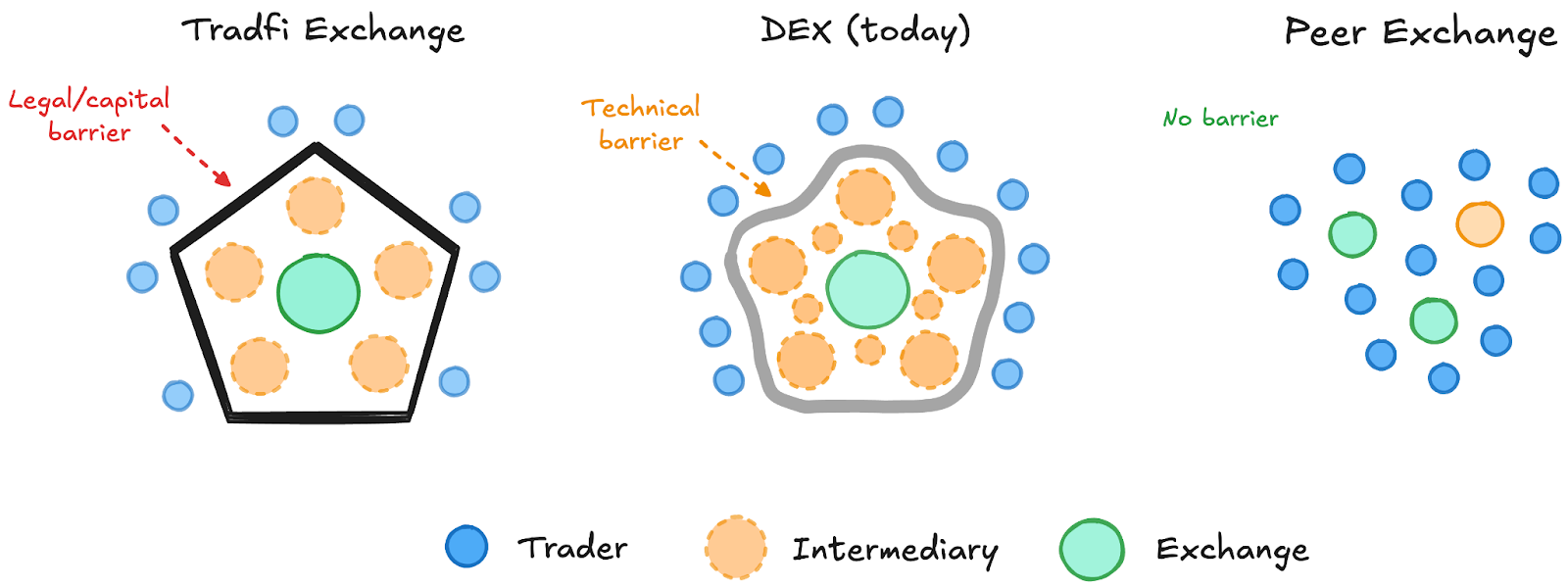Peer Exchanges
Exchanges aren’t built for you and me; they're built for brokers and market makers. We only trade on exchanges indirectly, through them.
This is not just true in tradfi, but also in defi.
DEXs rely on intermediaries
Despite appearances, you probably never traded on a decentralised exchange without help from a centralized intermediary.
Before you trade, a CEX/DEX arbitrage team ensures that the price on the DEX is in line with the market. A centralized router or auction builds your trade. And often, you delegate execution of your tx to your wallet (as in e.g. Metamask’s Smart Transactions).
The same in providing liquidity. It's so cumbersome to manage a concentrated liquidity position that many delegate it to someone like Arrakis, or don’t do it at all; much of the LP in DEXs comes from professional teams who have enough time to figure out how to make a profit from LP.
The dependency on these professional intermediaries is not a coincidence; protocol teams design DEXs for them – assuming that a DEX needs their help to be competitive.
Dependence adds risk and cost
But dependence on intermediaries is always risky, for the same reasons as in tradfi:
- Censorship: From one moment to the next, you may no longer be able to trade (because your intermediary censored the geography or asset you want to trade).
- Rent-seeking: Intermediaries take as much as they can (add fees, take surplus/rebates).
- Exploits: Powerful interfaces that are designed for professionals to contribute sophistication to the DEX also create room for loopholes (including MEV).
We can do better
Unlike in tradfi, we’re not legally bound to intermediaries. You can build a DEX that doesn’t rely on them. Let’s have a look at what an exchange is in its simplest form.
What is an exchange, really?
You go to an exchange to make an offer, in the hope that someone takes it. So an exchange only needs:
- Intent: Let you express what you want.
- Matching Engine: Match intents and settle them.
- Price: Determine the price at which traders feel is fair to settle.
- Trust: Be irreproachable.
So IF you can make matching engines trustless, price discovery good enough not to need arbitrage bots, and let users express intents the way they want – then you don’t need intermediaries anymore.
With TEEs you can now make any arbitrarily complex and open source logic trustless (e.g. see BuilderNET), and more and more logic that used to be private is becoming open source.
A trustless exchange, that does not rely on professionals has only one user group: The trade. And traders can interact with it directly, trading only with other traders like them.
Hence, this will be, a Peer Exchange.
Peer Exchanges internalize logic
A peer exchange has all the logic it needs to operate – built in. Unlike DEXs today, which outsource operational logic (such as how to LP or how to align prices with the market) to external actors (like searchers, market makers, and professional LPs).
The only input a peer exchange needs is for you to express your preference. E.g you want to buy ETH in the next hour as long as the price is within 1% of the current price, or lend out DAI as long as the expected return, including risk, is above 4%.
Peer exchanges are interesting, as they have some unique advantages.
Benefits of peer exchanges

- Easier to protect against MEV: Peer exchanges only need simple input, and simple interfaces have less room for exploits (MEV).
- Better UX: Peer exchanges don’t need to cater to intermediaries. So with fewer conflicting priorities, they can design a more delightful interface for traders and LPs.
- Less wasted effort: Simple interfaces limit opportunities for smart usage, so users spend less effort on wasteful competition.
- Fewer intermediaries: Limited ways to be clever about expressing what you want means you’re less likely to seek others to help you trade.
- Lower costs: Peer exchanges don't pay for external sophistication and leak less MEV. They don’t need to compensate for these costs, so they can offer better prices (lower fees) to traders.
- Credibly fair: If someone with more experience can easily take advantage of you, then an exchange is not equally safe for everyone to use. Peer exchanges can more radically remove opportunities for one user to take advantage of another.
This is not just theory; exchanges leaning into this direction, with success, start to show up.
Peer exchanges today
- ZKP2P: On & off-ramp 100% peer-to-peer, no intermediary.
- Superposition: Copy anyone's liquidity strategy with your wallet.
- Hyperliquid: Maintained mostly by an in-built user-funded market maker.
- Telegram Bots: Buy or sell, all execution logic built in, built for retail only.
PropellerHeads is working on a Peer Exchange as well: Turbine; designed to privately settle large trades against peers and DEXs with minimal price impact. Follow us on Twitter to be first to hear when we release.
And, if you’re working on new exchange designs, reach out to Tanay on Telegram @tanay_j – we’d love to help you win flow through Tycho.
Thank you @apriori for your review!






